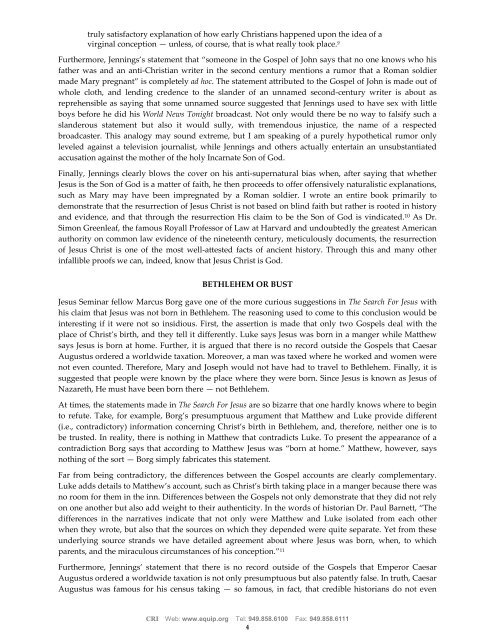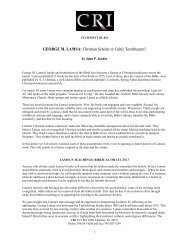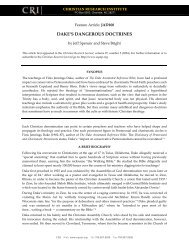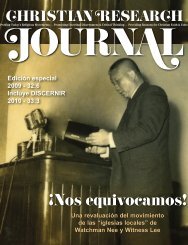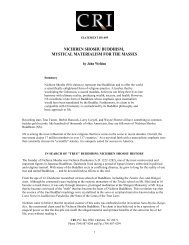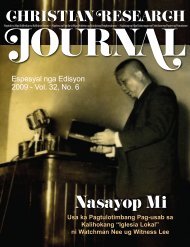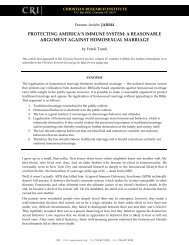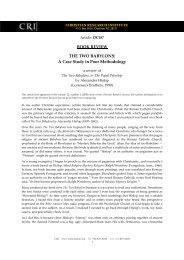THE SEARCH FOR JESUS HOAX - Christian Research Institute
THE SEARCH FOR JESUS HOAX - Christian Research Institute
THE SEARCH FOR JESUS HOAX - Christian Research Institute
You also want an ePaper? Increase the reach of your titles
YUMPU automatically turns print PDFs into web optimized ePapers that Google loves.
truly satisfactory explanation of how early <strong>Christian</strong>s happened upon the idea of a<br />
virginal conception — unless, of course, that is what really took place. 9<br />
Furthermore, Jennings’s statement that “someone in the Gospel of John says that no one knows who his<br />
father was and an anti-<strong>Christian</strong> writer in the second century mentions a rumor that a Roman soldier<br />
made Mary pregnant” is completely ad hoc. The statement attributed to the Gospel of John is made out of<br />
whole cloth, and lending credence to the slander of an unnamed second-century writer is about as<br />
reprehensible as saying that some unnamed source suggested that Jennings used to have sex with little<br />
boys before he did his World News Tonight broadcast. Not only would there be no way to falsify such a<br />
slanderous statement but also it would sully, with tremendous injustice, the name of a respected<br />
broadcaster. This analogy may sound extreme, but I am speaking of a purely hypothetical rumor only<br />
leveled against a television journalist, while Jennings and others actually entertain an unsubstantiated<br />
accusation against the mother of the holy Incarnate Son of God.<br />
Finally, Jennings clearly blows the cover on his anti-supernatural bias when, after saying that whether<br />
Jesus is the Son of God is a matter of faith, he then proceeds to offer offensively naturalistic explanations,<br />
such as Mary may have been impregnated by a Roman soldier. I wrote an entire book primarily to<br />
demonstrate that the resurrection of Jesus Christ is not based on blind faith but rather is rooted in history<br />
and evidence, and that through the resurrection His claim to be the Son of God is vindicated. 10 As Dr.<br />
Simon Greenleaf, the famous Royall Professor of Law at Harvard and undoubtedly the greatest American<br />
authority on common law evidence of the nineteenth century, meticulously documents, the resurrection<br />
of Jesus Christ is one of the most well-attested facts of ancient history. Through this and many other<br />
infallible proofs we can, indeed, know that Jesus Christ is God.<br />
BETHLEHEM OR BUST<br />
Jesus Seminar fellow Marcus Borg gave one of the more curious suggestions in The Search For Jesus with<br />
his claim that Jesus was not born in Bethlehem. The reasoning used to come to this conclusion would be<br />
interesting if it were not so insidious. First, the assertion is made that only two Gospels deal with the<br />
place of Christ’s birth, and they tell it differently. Luke says Jesus was born in a manger while Matthew<br />
says Jesus is born at home. Further, it is argued that there is no record outside the Gospels that Caesar<br />
Augustus ordered a worldwide taxation. Moreover, a man was taxed where he worked and women were<br />
not even counted. Therefore, Mary and Joseph would not have had to travel to Bethlehem. Finally, it is<br />
suggested that people were known by the place where they were born. Since Jesus is known as Jesus of<br />
Nazareth, He must have been born there — not Bethlehem.<br />
At times, the statements made in The Search For Jesus are so bizarre that one hardly knows where to begin<br />
to refute. Take, for example, Borg’s presumptuous argument that Matthew and Luke provide different<br />
(i.e., contradictory) information concerning Christ’s birth in Bethlehem, and, therefore, neither one is to<br />
be trusted. In reality, there is nothing in Matthew that contradicts Luke. To present the appearance of a<br />
contradiction Borg says that according to Matthew Jesus was “born at home.” Matthew, however, says<br />
nothing of the sort — Borg simply fabricates this statement.<br />
Far from being contradictory, the differences between the Gospel accounts are clearly complementary.<br />
Luke adds details to Matthew’s account, such as Christ’s birth taking place in a manger because there was<br />
no room for them in the inn. Differences between the Gospels not only demonstrate that they did not rely<br />
on one another but also add weight to their authenticity. In the words of historian Dr. Paul Barnett, “The<br />
differences in the narratives indicate that not only were Matthew and Luke isolated from each other<br />
when they wrote, but also that the sources on which they depended were quite separate. Yet from these<br />
underlying source strands we have detailed agreement about where Jesus was born, when, to which<br />
parents, and the miraculous circumstances of his conception.” 11<br />
Furthermore, Jennings’ statement that there is no record outside of the Gospels that Emperor Caesar<br />
Augustus ordered a worldwide taxation is not only presumptuous but also patently false. In truth, Caesar<br />
Augustus was famous for his census taking — so famous, in fact, that credible historians do not even<br />
CRI Web: www.equip.org Tel: 949.858.6100 Fax: 949.858.6111<br />
4


